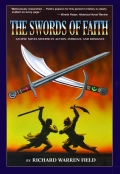Books-Into-Movie Commentary: True Grit February 7, 2011
Posted by rwf1954 in books, books into movies, Charles Portis, Coen Brothers, Jeff Bridges, John Wayne, movie commentary, movies, movies based on books, True Grit.Tags: book commentary, books, books into movies, Charles Portis, Coen Brothers, Jeff Bridges, John Wayne, movie commentary, movies, movies based on books, True Grit
trackback
(Richard Warren Field wrote the award-winning novel,
The Swords of Faith. Read why this book will make a great movie.)
Charles Portis’s novel, True Grit, has now been made into a movie for a second time. This offers lots of opportunity for comments as we compare the book to the movies, and the movies to each other. To focus this commentary, I’ll 1) start with some overall comments, 2) discuss each movie compared to the book, and 3) offer a chapter-by-chapter synopsis of the novel.
_______
Before this new “True Grit” film, I had always thought of “True Grit” as the movie which finally got John Wayne an Oscar. John Wayne evolved into such an iconic personality/heroic-image that his acting was not always taken seriously. “True Grit” became the film that allowed critics and Oscar voters to take his acting seriously. The movie was a platform for John Wayne, the actor. But what kind of movie was “True Grit?” Answering that question undoubtedly led the Coen Brothers producing team to look at remaking the film. Because absent the John Wayne platform element, the “True Grit” of 1969 allowed many opportunities for improvement.
The 1969 release is a tidy movie, much more neat and orderly than the world portrayed in Portis’s novel. At the risk of sounding too cute, the first “True Grit” wasn’t gritty enough! Portis’s novel was written in the late 1960s at a time when Americans were looking critically at their history. It seems to me that Portis sought to offer an uncompromising portrait of the American West in the post Civil War era. He vividly dramatizes a setting that is on the fringes of civilization—a place one step from lawlessness, a place where the strong and vicious try to victimize gentler, more civilized types, and then ooze back into anonymous regions lacking civilization. At this place and time, it took men nearly uncivilized themselves to vanquish the victimizers. That is Rooster Cogburn—a man who has been an outlaw, a man whose scruples seem flexible depending on circumstances, a man with “true grit.” The first movie is tidy; John Wayne couldn’t completely cast off his heroic, iconic nature, and maybe moviegoers were not thought to be ready for a film as uncompromising as the book, at least not as a John Wayne vehicle. This discrepancy allowed the filmmakers of the 2010 “True Grit” the opportunity to capture the “grittier” tone of the book.
In my opinion, almost everything about the newer film is an improvement on the first film. First, and maybe foremost, this second film was not a John Wayne vehicle. So they could cast a great actor who doesn’t always play heros in the role of Rooster Cogburn. Jeff Bridges portrays a more convincing Rooster Cogburn, more consistent with Portis’s character than John Wayne’s fun but definitely John Wayne-ish Cogburn. Kim Darby plays Mattie Ross in the first version and plays her well, but she is clearly older than the fourteen year old she is supposed to be playing. Hailee Steinfeld is more convincing—when LaBoeuf spanks her, we feel her indignation and helplessness more powerfully. We feel the frustration of a confident fourteen-year-old unable to assert her will against brute strength, pleading for justice from Cogburn. Glen Campbell as LaBoeuf was just plain awful; Matt Damon had no trouble improving on that performance. Similarly, Josh Brolin seems more age-appropriate and consistent with Chaney/Chelmsford, and Berry Pepper is also a shade more convincing as Lucky Ned Pepper than Robert Duval.
In many places in both films, dialogue is taken word for word from the book. This is certainly a tribute to Portis’s gift for character and dialogue. Many lines like “Fill your hand, you son of a bitch!” fill pages of the book, making it directly into the dialogue of the movie.
This second “True Grit” movie offers a more uncomfortable atmosphere, with dimly lit scenes, inclement weather, and untidy settings that look mostly untamed and undisturbed by human beings.
The first “True Grit” goes completely “Hollywood” at the end, creating another dissonance between the tone of Portis’s novel and the way the filmmakers told the story. In the book, Mattie Ross loses her arm as a result of her injuries—not in this tidy movie version. In the first movie version, Rooster Cogburn joins Mattie at the family cemetery and agrees to be buried with her family! True, in the book, Rooster Cogburn is taken for burial by Mattie Ross after his death, but there is no direct interaction at all between Mattie Ross and Rooster Cogburn after Mattie Ross is dropped off for medical care at the end of the main story. Portis resists the temptation to offer an orderly, feel-good ending. Many people at the fringes of creeping civilization in the American West of the last half of the Nineteenth Century did not live tidy, orderly lives. For a man like Rooster Cogburn, sentimentality was not a luxury he could afford if he was to survive in the world he inhabited.
One area I do not believe was an improvement from the first film to the second film was the music. The first film used a grand orchestral score from film-scoring legend, Elmer Bernstein. For this version of “True Grit,” for the tidy version, such a score was appropriate. For the newer version, a sweet orchestral score was all wrong, and may have sabotaged the tone of the film in places. An earthier score, a Ry Cooder type score, with acoustic guitars, harmonicas—simpler, earthier, “grittier”—would have helped convey the mood of this less tidy remake.
_______
Comments specifically on the 2010 movie version of “True Grit:”
- As if to signal immediately that this second “True Grit” would be book-faithful (and the second film is very close to the book, as close as movies get to following a book), the movie starts off with Mattie reciting the opening lines of her first-person account of this story, the opening lines of the novel True Grit.
- Cogburn and LaBoeuf have a sharper conflict in the movie, separating in places where they do not separate in the book. This creates some slight variations in the plot, though the basic plot outline remains the same.
- I do not recall the weird scene with the dentist wearing the bearskin in the book. (Maybe some sharp-eyed reader recalls this. I skimmed the book a second time and still did not spot this scene.)
- The trail never really goes “cold” in the book. Though some of Cogburn’s schemes to track Chaney/Chelmsford, and Ned Pepper, do not always work to perfection, Cogburn still manages to stay pretty well on the trail.
- This movie almost totally adheres to the unsentimental ending of the book—with one exception. In the book, Cogburn makes no attempt to contact Mattie Ross at all. She hears of him and sends letters—he never replies. She finds out about he is part of a wild-west show from a newspaper article sent to her by someone else, not Rooster Cogburn. As in the movie, she misses a reunion by just a few days in 1903, discovering he has passed away just before her arrival. On her initiative, she buys a marble headstone and buries him with her family. We are left to wonder whether Rooster Cogburn would have agreed with this at all. Untidy. Like the time and place of the book.
Comments specifically on the 1969 movie version of “True Grit:”
- The earlier movie version of “True Grit” starts right off with tidier story-telling. The film shows Mattie Ross with her father before he leaves for Fort Smith with Tom Chaney/Chelmsford, and shows the murder of Frank Ross. The book starts off with Mattie coming to town after the murder—the murder is back-story in the book. We never meet Mattie’s father in real-time nor do see her interaction with her father in real-time.
- Food seems much tidier in this movie. At one point, at McAlester’s, we see Mattie Ross sitting down to what looks like a family picnic.
- LaBoeuf does not die in the book.
_______
Synopsis of True Grit
Note: This will be a broad synopsis of True Grit. I must caution the reader, however, that Charles Portis’s True Grit is as much about character and atmosphere as it is about plot and events. It is no-holds-barred uncompromising storytelling, showing more interest in creating a story that feels real and authentic, than a story that feels good. Characters suffer realistic consequences for their actions:
- Mattie Ross suffers life-changing injuries as result of her insistence on joining two grown men on a dangerous mission.
- Characters do not magically go on to live perfect lives after their experiences.
So as I offer this dry sequence of events, I recommend that readers experience the book directly to get the true feel for True Grit.
Unlabeled Chapters One and Two. Mattie Ross starts off telling her story—this is a first person novel—she tells how to Tom Chaney, a “tenant working for hire,” kills her father. While Mattie Ross’s father and Chaney are in Fort Smith, Arkansas to buy some horses, Chaney gets drunk and loses money at cards. When he grabs a gun to go after a man he says cheated him, Mattie Ross’s father confronts Chaney, and Chaney shoots him, then runs away to Oklahoma/Indian territory. Mattie Ross, fourteen years old, aggressively settles matters with the man who sold the horses to her father, invoking the name of her lawyer. She is disappointed that the authorities are not taking more interest in apprehending Chaney. Mattie Ross asks “who is the best U.S. Marshal they have.” The sheriff tells her “the meanest one is Rooster Cogburn… a pitiless man.” He will be at federal court the next day.
Unlabeled Chapter Three. Mattie Ross watches Rooster Cogburn testify in court. There is an implication that Cogburn has a grudge against the defendant and his dead father and brother—shot by Cogburn. But Cogburn holds up well. Mattie Ross proposes fifty dollars as a reward for Cogburn to bring back Tom Chaney. Cogburn insists on one hundred, fifty paid in advance.
Unlabeled Chapter Four. Mattie Ross meets LaBoeuf, a Texas Ranger. He is also looking for Tom Chaney (actually Theron Chelmsford and other aliases as well), who is wanted for killing a state senator in Texas. He suggests they join efforts, but the two part angrily after disagreeing over what will be done with Chaney/Chelmsford when he is caught. Mattie Ross wants him hanged in Fort Smith, Arkansas. LaBoeuf will earn a considerable reward for bringing Chaney/Chelmsford back to Texas.
Unlabeled Chapter Five. Mattie Ross tells Rooster Cogburn that she will be going with him. Cogburn resists, but after considerable argument, and in exchange for Mattie Ross’s assistance with his claims for payment from his superiors, he agrees. (Rooster Cogburn is not good with paperwork—Mattie Ross hand been handling the paperwork at her father’s ranch.) But the next day, she finds LaBoeuf and Cogburn together. LaBoeuf has access to a bigger reward, and they agree to go on together, without her. She tags along anyway, crossing the river on her pony, into Indian territory/Oklahoma, beating the ferry across. She follows them until they set up an ambush and LaBoeuf takes a switch to her. But Cogburn stops LaBoeuf and decides to let Mattie join them. LaBoeuf believes they have made a mistake.
Unlabeled Chapter Six. The three track Chaney’s likely whereabouts to a house where they believe Cheney has joined a gang led by Lucky Ned Pepper. Neither Pepper nor Chaney/Chelmsford are there. They end up killing the men who are there when those men resist Cogburn’s and LaBoeuf’s approach to the house. They get information on where Pepper and Chaney/Chelmsford might be. Cogburn goes into his background, as a Confederate soldier and thief, as well as a U.S. Marshal. Lucky Ned Pepper shows up the following day and realizes his place-to-stay has been compromised. When Pepper fires his revolver, LaBoeuf fires his rifle from his hiding place. Cogburn is unhappy they have given away their position, but takes out some of the gang with his rifle. Two of the gang are killed, the others escape, and no new information about Chaney/Chelmsford is learned. LaBoeuf is hit in the arm.
They bring the bodies to what will become the town of McAlester, Oklahoma. They find out Pepper and his gang have robbed a train, taking considerable loot. Cogburn gets more information on where to go after Chaney/Chelmsford. He tries to talk Mattie into staying behind, but she insists on remaining with them, and this time LaBoeuf agrees that Mattie should come along. They take a long ride. Mattie struggles with the difficult conditions, but won’t admit she is having any problems.
Final Unlabeled Chapter. The next morning, Mattie goes to a stream to fill canteens and comes face-to-face with Chaney/Chelmsford. He mocks her at first, not taking her seriously. But she shoots him, and the only reason she doesn’t kill him is because her gun jams. He is hit in the side. Mattie Ross calls for LaBoeuf and Cogburn. Chaney’s “bandit friends” also come running. But the bandits reach her first and take her. Lucky Ned Pepper threatens to kill her unless Cogburn and LaBoeuf withdraw. Cogburn tries to say he doesn’t care about the girl, but does withdraw when Pepper calls his bluff and threatens to kill her immediately. Mattie Ross explains to Pepper why she wants Chaney/Chelmsford. Pepper seems to take it in, and is not unsympathetic to her. But, he does say, “I will do what I have to do,” meaning if he needs to harm her, he will.
Pepper will not let Chaney/Chelmsford hurt Mattie Ross, withholding his share of the robbery proceeds and telling him he will not get his share if he hurts her. Pepper leaves the two together, instructing Chaney to leave her at another location. Mattie Ross does not like this idea, and asks to walk away on her own. Pepper insists on this arrangement, again saying Chaney/Chelmsford will not get paid unless the she remains safe. Mattie Ross attempts to escape from Chaney/Chelmsford by throwing hot water on him and running. He catches up to her, and she figures she is “done for.” But just then, LaBoeuf comes up on Chaney and thwarts his efforts to hurt Mattie Ross.
Rooster Cogburn is watching for the other bandits. LaBoeuf and Mattie move around a pit with snakes in it. They see the other gang-members riding away from them. Rooster Cogburn charges at four armed bandits. “Fill your hand you son of a bitch!” he yells at Ned Pepper after he refuses Pepper’s request to step aside and starts his charge. Mattie Ross is now convinced: Rooster Cogburn has “true grit.” Cogburn kills two of the four. One escapes. Ned Pepper is shot but still on his horse. Rooster Cogburn’s horse is dead. He takes shotgun pellets in his face and shoulders. Pepper goes after the horseless Cogburn. LaBoeuf shoots Pepper dead with his rifle from long distance.
But as they start to celebrate, Tom Chaney/Chelmsford smashes LaBoeuf’s head with the rock. Mattie Ross grabs her pistol. This time it doesn’t jam, and she shoots Chaney/Chelmsford in the head, killing him. But the kick from the gun sends her into the mossy pit where she breaks her arm and lands in a group of rattlesnakes. A dazed but still able LaBoeuf, and Rooster Cogburn, extricate her, but not before she is bitten by a rattlesnake. Cogburn takes her to the nearest doctor. She recovers, but loses her forearm.
Mattie Ross never again has direct contact with Rooster Cogburn. She writes him more than once, but receives no replies. She makes sure she sends him the balance of his payment, and corrects any blame attributed to him for her injuries. LaBoeuf retrieves Chaney/Chelmsford’s body to get the reward in Texas. Years later, Mattie Ross finds out Cogburn is playing in a wild-west show in Memphis, Tennessee. She takes a train to see the show, but finds out Cogburn has died a few days before her arrival. She claims his body and has him buried with a marble headstone in her family plot. She has become a prosperous single woman/banker, an “old maid,”—she says of marriage: “I never had time to fool with it.”





Comments»
No comments yet — be the first.